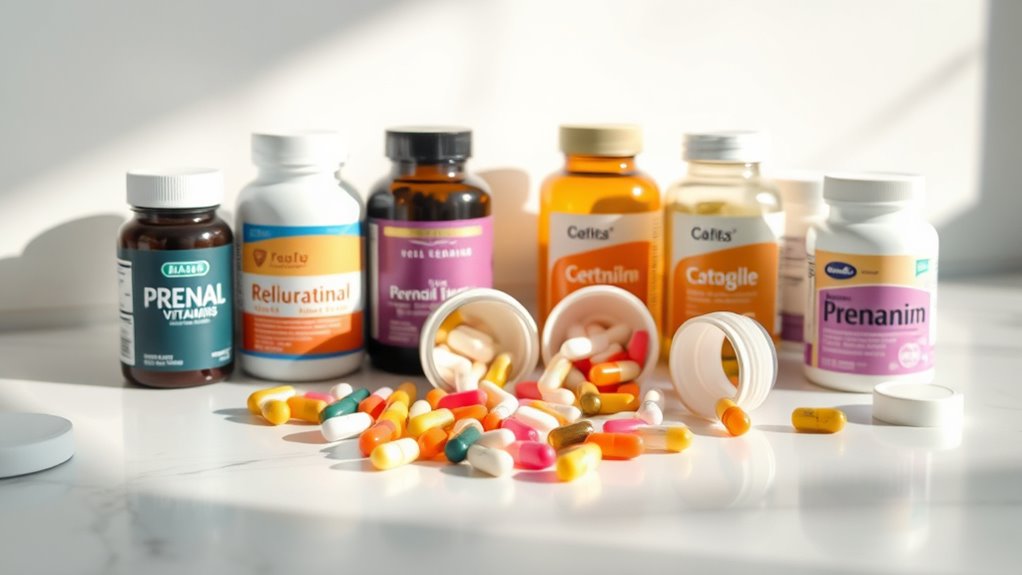Not all prenatal vitamins are created equal because they differ in nutrient quality, forms, and dosages that impact your and your baby’s health. Some formulations offer better absorption, like methylfolate instead of folic acid, or bioavailable minerals. Others might contain fillers, synthetic additives, or inadequate nutrient amounts. Choosing a high-quality option tailored to your needs makes a big difference. Keep going to discover how to select the best prenatal vitamin for your journey.
Key Takeaways
- Variations in nutrient forms, like methylfolate versus folic acid, affect absorption and benefits, especially for those with genetic mutations.
- Iron content and absorption are influenced by co-factors like vitamin C and the presence of calcium or dairy.
- Quality of ingredients, including bioavailability and absence of fillers or contaminants, impacts supplement effectiveness.
- Not all prenatal vitamins contain adequate levels of essential nutrients like folic acid or iron for optimal prenatal health.
- Personalized formulation and consulting healthcare providers ensure the supplement meets individual nutritional needs.

Taking prenatal vitamins is an important step when planning or expecting a pregnancy, as they help guarantee you and your baby receive essential nutrients. Not all prenatal vitamins are created equal, so understanding what sets them apart can make a big difference in your health and your baby’s development. One key nutrient to look out for is folic acid, which offers numerous benefits. Folic acid helps prevent neural tube defects in developing babies and supports proper cell growth. Ensuring your prenatal contains the right amount of folic acid—generally 400 to 800 micrograms daily—is essential. But just having folic acid isn’t enough; the form matters. Some supplements contain methylfolate, a form of folate that’s more easily absorbed, especially if you have genetic variations like MTHFR mutations. This can maximize the folic acid benefits and reduce the risk of deficiencies.
Another critical aspect to consider is iron. Iron helps prevent anemia during pregnancy and supports increased blood volume. However, your body’s ability to absorb iron varies depending on how you take it. To optimize iron absorption tips, take your prenatal vitamin with a source of vitamin C, like orange juice or a small glass of citrus. Vitamin C enhances iron absorption, making sure you’re getting the most out of the supplement. Avoid taking iron with calcium-rich foods or dairy, as calcium can interfere with iron absorption. If you’re prone to iron deficiency or anemia, discuss with your healthcare provider whether you need a higher dose or additional iron supplements. Some prenatals include heme iron, which is more efficiently absorbed, while others contain non-heme iron, which may require careful timing and vitamin C intake to maximize benefits.
Furthermore, the quality of the ingredients used in prenatal vitamins is crucial, as supplement quality can significantly impact nutrient absorption and effectiveness. Look for products that use bioavailable forms of nutrients—meaning your body can easily absorb and utilize them. Cheap fillers or synthetic additives can reduce the effectiveness of your prenatal vitamin. It’s also wise to choose a reputable brand that adheres to strict manufacturing standards, ensuring you’re getting a supplement free from contaminants. Remember, a one-size-fits-all approach doesn’t work with prenatal vitamins. Your specific nutritional needs might require tailored formulations, so consulting your healthcare provider can help you select the best supplement for your unique situation. Ultimately, the right prenatal vitamin supports your health and your baby’s development more effectively, emphasizing the importance of choosing wisely rather than settling for the first product on the shelf.
Frequently Asked Questions
Are Prescription Prenatal Vitamins Better Than Over-The-Counter Options?
You might wonder if prescription prenatal vitamins are better than over-the-counter options. While prescriptions often cost more, they typically have consistent ingredient levels, reducing variability. Over-the-counter vitamins can vary in ingredient quality and dosage, which might affect their effectiveness. Ultimately, it’s important to discuss your needs with your healthcare provider to choose the best option for your pregnancy, balancing cost, quality, and ingredient reliability.
Can Prenatal Vitamins Cause Any Side Effects or Allergies?
You might experience some side effects or allergies from prenatal vitamins. Common allergic reactions include rashes or difficulty breathing, while gastrointestinal issues like nausea, constipation, or upset stomach are also possible. It’s important to pay attention to your body and talk to your doctor if you notice any allergic reactions or persistent gastrointestinal problems. Choosing the right vitamin and following recommended doses can help reduce the risk of these side effects.
How Do I Choose the Best Prenatal Vitamin for My Needs?
To select the best prenatal vitamin for your needs, focus on supplement quality and nutrient balance. Look for products with high-quality ingredients, minimal fillers, and essential nutrients like folic acid, iron, and calcium. Check labels carefully, and consider consulting your healthcare provider to guarantee the vitamin matches your specific health needs. A well-balanced supplement supports your pregnancy and helps prevent deficiencies, giving you peace of mind.
Are There Specific Brands Recommended by Healthcare Providers?
Think of choosing a prenatal vitamin as finding a trusted compass—it guides your journey. Many healthcare providers recommend brands with strong reputations and high ingredient quality, like Garden of Life or Thorne. These brands prioritize purity and effectiveness, giving you peace of mind. Always consult your doctor to match the best prenatal vitamin with your needs, ensuring you and your baby stay on the right path.
Is It Safe to Take Prenatal Vitamins During Breastfeeding?
You might wonder if it’s safe to take prenatal vitamins while breastfeeding. Generally, they are safe and can support your nutrient needs during this time. Breastfeeding safety depends on choosing the right vitamins to guarantee proper nutrient absorption for both you and your baby. Always consult your healthcare provider before starting any new supplement to confirm it aligns with your health needs and to optimize nutrient absorption.
Conclusion
Remember, not all prenatal vitamins are created equal—choosing the right one can make a real difference in your pregnancy. Did you know that studies show women taking high-quality prenatal supplements have a 20% lower risk of birth complications? So, take the time to research and select a supplement that meets your needs. Your health and your baby’s development depend on it. Make informed choices and give your little one the best start possible.









